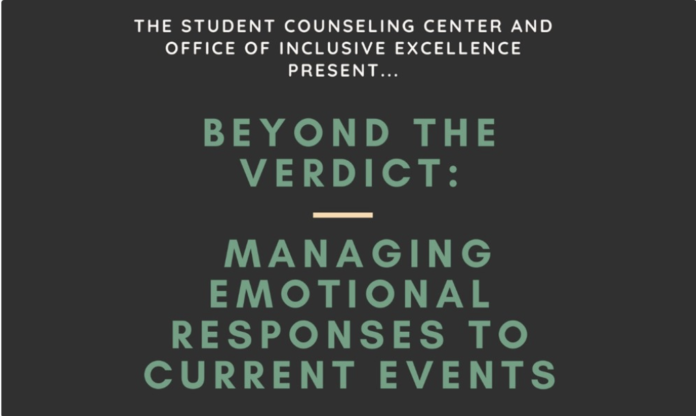On Wednesday night, at 6:30 pm, the Student Counseling Center (SCC) and Office of Inclusive Excellence (OIE) collaborated to host “Beyond the Verdict: Managing Emotional Responses to Current Events.” The Zoom event had 18 students that participated in a conversation mainly focused around the verdict regarding the anxiety-inducing, 16 day long, Derek Chauvin trial.
On Tuesday afternoon, former Minneapolis police officer Derek Chauvin was convicted on three counts of second-degree unintentional murder, third degree murder and second degree manslaughter. This trial was long awaited after the murder of George Floyd on May 25, 2020.
The event was planned in advance before the trial timeline was known, but members of the SCC and OIE found this conversation to be necessary and wanted students to be prepared for what happens either way a verdict goes and how to prepare after.
Keisha Booker, assistant director in the Office of Inclusive Excellence, prepared the group for what the discussion would hold.
“We are well aware that this is just one of many current events that could be emotionally triggering to some, and so we wanted to give space to talk about more than just the Derek Chauvin trial,” Booker said. “. . . It [the event’s title] was created well before the verdict and so we are moving beyond what happened in yesterday’s courtroom.”
The event then formally began with a guided meditation from Rodney Carson, a part-time counselor in the Student Counseling Center, having participants imagine a game of tug-of-war over a bottomless pit representing, ” . . . emotional trauma, the pain, frustrations, struggles that you have been through.”
The game of tug-of-war represents something much bigger. Carson continues by saying, “This platform is about letting go from the rope. The platform today is about moving forward from the verdict. Coming together, healing and respecting each other’s opinion.”
The participants are then asked to imagine what anxieties, depressions and things from the past year that the rope represents.
This allowed students to open up with some of their anxieties regarding the many events through the last year, and it gave both Carson and Booker a chance to share anecdotes of some of their personal fears.
A common anxiety among the group was that these brutal incidents keep on occurring with no end in sight. With the common occurrences and very few people being held accountable, many people are stuck in a rut.
One student in the group shared his feelings about our country’s reaction to this trial and how it’s effected the masses.
“This case, I believe, was a big wake up call for this country to see how law enforcement should change the policies and the procedures that they have while interrogating suspects. . . I think that the video of George Floyd . . . shows a lot of what may never have been told if people weren’t willing to come forward.”
The conversation took a turn to how students can make the change. Booker began to share advice that she offers the students she works with in the Office of Inclusive Excellence.
“A conversation I have with my students, is like when they’re requesting something. ‘We want change, we want policy change, thought process change,’ and I have a conversation after of . . . how specifically would you like to see change.”
“You’re the future, so you get to make that request, and it’s also okay if you haven’t thought about that,” Booker said.
As students who will be leading in the future, the discussion turned towards how the media is effecting everyone. Many people brought up their COVID-19 media overload as well as the increased reporting of horrific cases, similar to Floyd.
Students wondered how they could combat the stress and anxiety from the media, and Carson offered up a piece of advice he regularly falls back on.
“When you take in negativity, you’re probably going to get negative outcomes. You bring in positivity, it promotes positivity,” Carson started off. “We have control over what we bring in. . . I hear all the negative reports from the news . . . bring me positive things you hear from the news and that’s when you start taking that control back.”
Students also brought up that they frequently feel they fall behind if they aren’t keeping up with the news and checking all different types of media. Messina reminded students that it’s okay, and encouraged to take breaks.
The support group had active engagement among the students and hosts, conversation was productive and students left feeling lighter.
The Student Counseling Center wanted to remind students that they are an available resource for students, regarding social issues and beyond. They can be contacted at 724.738.2034 or scc@sru.edu.








